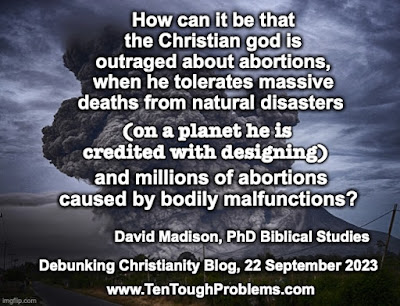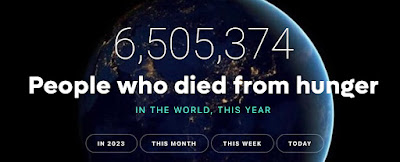Without intending to!
A member of the congregation is hospitalized with cancer. So fellow parishioners organize prayer marathons to plead with their god to intervene—and it works! So they claim when their friend’s cancer has been defeated, after considerable intervention by medical professionals. What a relief that god granted their wish.
But what are the implications of this belief? It’s a good idea to think it through.
In fact, this is an example of belief that sabotages the concept of a good god—for three reasons: (1) the guy in the next bed also had cancer, but there were no prayer marathons for him and he died. Didn’t god notice or care? An omnipotent god is influenced by prayer marathons? (2) In fact, if god is capable of curing cancer, why does he allow any cancers in the world? Why not get rid of the disease altogether—kick it off the planet? Stephen Fry was once asked what he would say to god when he dies, if god is, after all, real. His response: “Bone cancer in children? What’s that about? How dare you.”
(3) The god-cures-cancer claim is based on the assumption that the all-knowing deity is aware of what’s happening inside our bodies. If we look at diseased cells or tissues (extracted during a biopsy) under a microscope, we can see the activity of the pathogens. Surgeons do this in their efforts to save the patient. The all-knowing deity sees it all without a microscope—and thus knows what has to be done to effect a cure. The prayer marathoners have no doubt that their god has these amazing powers of perception, this detailed knowledge of our biological mechanics.
This is a logical extension of the certainty that their god is aware of everything that every human on the planet does or thinks. The hairs on our heads are numbered; not even a sparrow falls to earth without god being aware (Matthew 10:26-31); on the day of judgement, we’ll be held accountable for every careless word we utter (Matthew 12:36); if we don’t believe in Jesus we will suffer god’s wrath (John 3:36).
But this confidence that god has detailed knowledge of what’s happening in our bodies at microscopic levels has major implications/complications. How can this god not know that a high percentage of fertilized human eggs never make it to maturity? That is, they abort naturally, either at the zygote or embryonic stage. In this 2012 DCB article by Jonathan MS Pearce, God Loves Abortion!, you’ll find statistics, as well as in this 2023 article on the March of Dimes website.
What are the implications for theology? Pearce states the following:
The outrage against abortion is yet another symptom of horribly derailed theology.
The Christian crusaders against abortion seem to be under the spell of an idealized concept of god that is far removed from the wrathful god portrayed in the Bible. In one episode of Call the Midwife, about mid-wife nuns in post-war London, we find the story of a pregnant woman who has been diagnosed with cancer. She is in anguish, certain that god is judging/punishing her for something she’s done. But the nun who is caring for her is confident that is not so: “I do not believe in a God who judges.” Clearly, this benevolent sister had not read her Bible.
We find the violent arrival of the kingdom of god described in Mark 13, which includes the warning, “Woe to those who are pregnant and to those who are nursing infants in those days!” (v. 17) They will be among the casualties. In I Samuel 15, Yahweh orders Saul to commit genocide: “Now go and attack Amalek and utterly destroy all that they have; do not spare them, but kill both man and woman, child and infant, ox and sheep, camel and donkey.” (v. 3)
The Genesis flood story—Noah’s Ark—is genocide on a massive scale, carried out by god himself. The story is commonly sanitized for children by showing animals entering the ark, and featuring the rainbow at the end. Yet it is a horrifying story. If understood as an actual event—which so many Christians seem to do—the god who carried it out was not the least bit concerned with the toddlers and pregnant women who perished. Can we imagine anything more grotesque than an entertainment theme park designed to celebrate this genocide, namely Ken Ham’s Ark Encounter? Truly, derailed theology. Let’s bring the idea home: even the most devout people I know were deeply stressed in the wake of the 2004 Indian Ocean tsunami—a minor disaster compared to the Genesis flood. There was catastrophic loss of life, more than 200,000 killed. James A. Haught stated the obvious:
Devout conservatives are so sure that this the case, but then we run into the next major problem: how can their theology be verified? In fact, there are many Christians who are not so sure that abortion violates the will of god; who are far more sure that their god is concerned for women who, for a variety of reasons, are not ready for pregnancy and motherhood. But the fact is that no theologies can be verified. We ask believers—and we ask it repeatedly—to show us where we can find reliable, verifiable, objective evidence for the god(s) they worship, and for what these gods supposedly require of humans.
We don’t ask this just out of idle curiosity. Devout folks, who are so sure of their theology, are determined to make it the basis for public policy. Even to the extent, in some cases we’ve heard recently, of making getting an abortion punishable by death. Christians should look around at the many different brands of their faith, and at other monotheisms. If Catholics held power and could set public policy, would Protestants welcome a ban on all contraceptives? If Muslims were suddenly in charge, would Christian women welcome mandatory hijab laws?
Because of strident, unverifiable theologies, pushed with such fervor by their advocates, it’s been an uphill battle to achieve and preserve equal rights for people of different races, for women (for control over their own bodies) and for gay/lesbian/transgender citizens. Diversity should be welcomed, cheered, appreciated. We come up short in trying to find widely embraced theologies that support such diversity.
There has been a lot written about abortion on the Debunking Christianity Blog—check it out for a better understanding of the bad theology that drives the anti-abortion advocates.
David Madison was a pastor in the Methodist Church for nine years, and has a PhD in Biblical Studies from Boston University. He is the author of two books, Ten Tough Problems in Christian Thought and Belief: a Minister-Turned-Atheist Shows Why You Should Ditch the Faith, now being reissued in several volumes, the first of which is Guessing About God (2023) and Ten Things Christians Wish Jesus Hadn’t Taught: And Other Reasons to Question His Words (2021). The Spanish translation of this book is also now available.
His YouTube channel is here. At the invitation of John Loftus, he has written for the Debunking Christianity Blog since 2016.
The Cure-for-Christianity Library©, now with more than 500 titles, is here. A brief video explanation of the Library is here.



No comments:
Post a Comment